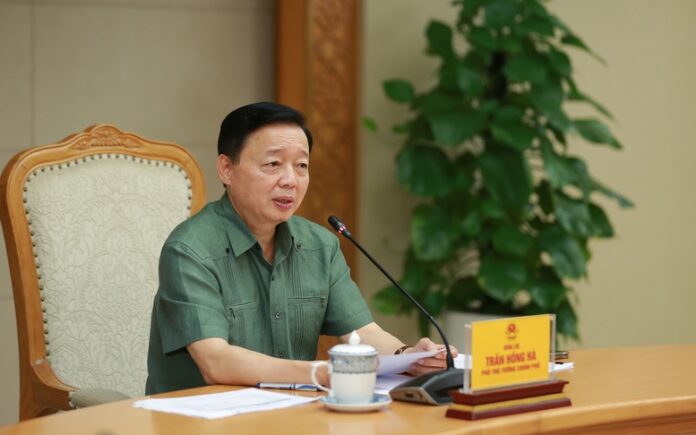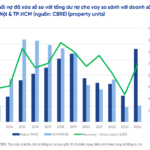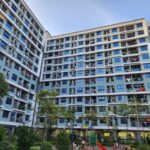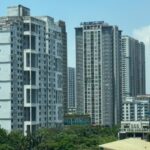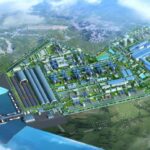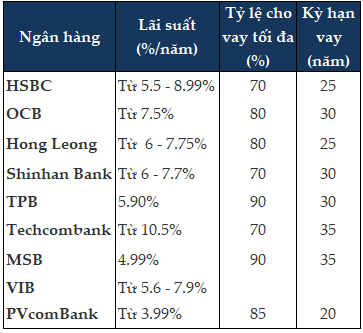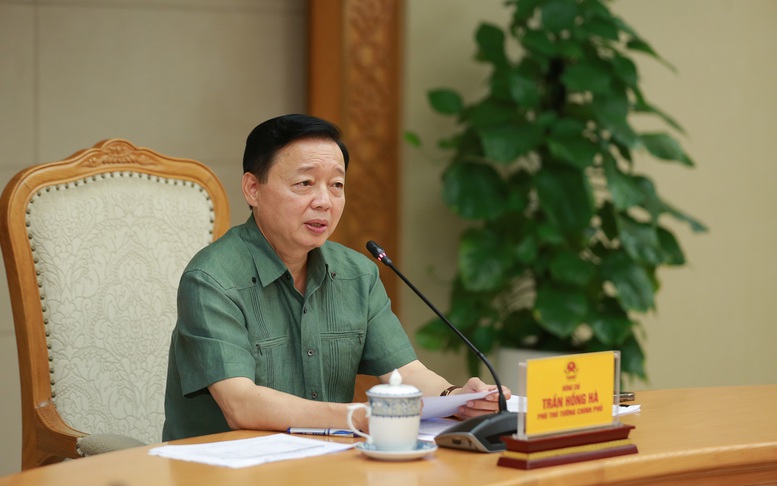
Deputy Prime Minister Tran Hong Ha points out the prominent issues in the real estate market. (Source: Chinhphu.vn)
On May 15, Deputy Prime Minister Tran Hong Ha held a meeting with the Ministry of Construction, other relevant ministries, associations, and real estate businesses, with online connections to several localities, to discuss the situation of the real estate market in the first months of 2025.
At the meeting, Deputy Minister of Construction Nguyen Van Sinh cited data from the State Bank of Vietnam, stating that as of the end of March 2025, the credit balance for real estate business reached over VND 1,560 trillion, an increase of about VND 260 trillion compared to the end of 2024 (over VND 1,300 trillion).
The Deputy Minister assessed that there is still a mismatch in the supply of real estate, and prices are high, so it has not yet met the housing needs of the people. Many projects face difficulties and obstacles in legal procedures, and the time for implementing processes and procedures is prolonged. Some real estate businesses are facing capital difficulties in implementing projects.
According to Le Hoang Chau, Chairman of Ho Chi Minh City Real Estate Association (HoREA), the real estate market shows slight signs of recovery and has just overcome the most difficult period. However, house prices remain high and there are no clear signs of decline. It is expected that by 2026-2027, there will be more supply of commercial housing in the middle segment.
Speaking at the conference, Deputy Prime Minister Tran Hong Ha pointed out that the real estate market has many long-standing problems, alternating between “freezing” and “abnormal overheating,” leading to significant price fluctuations and causing chain effects on credit and finance. The market still shows many signs of instability. Many studies show that the rate of increase in real estate prices in Vietnam is among the highest in the world, while people’s access to housing is decreasing. This is a very worrying situation.
Although the Government and the Prime Minister have repeatedly directed the Ministry of Construction to research, report, and propose solutions, up to now, there has been no clear report presented. Many existing issues remain unresolved. Many meetings and workshops have been held, and many conclusions have been issued, but the reality shows very slow progress.
“Today’s meeting needs to clearly recognize the picture of the real estate market, point out the bright and dark spots, identify the causes from both the state management side and the enterprises, and propose specific solutions to the National Assembly and the Government,” said the Deputy Prime Minister. He pointed out that the prominent issue in the real estate market is the imbalance between supply and demand and the unreasonable structure of products. Many businesses lack resources and capabilities to develop projects. The real estate market needs stronger and more practical “medicines.”
“If the problem lies in land, we must handle the land issue; if it is credit, we must handle the credit issue; if it is procedures, we must reform them substantially. At the same time, there needs to be a control mechanism to ensure that real estate business goes in the right direction,” emphasized the Deputy Prime Minister.
Deputy Prime Minister Tran Hong Ha assessed that although there are signs of recovery after the COVID-19 pandemic, the growth rate of the real estate market is still incomparable to the pre-pandemic period, affecting the entire ecosystem of related investments and businesses.
There is a serious imbalance in the structure of real estate products. The supply of middle-income and social housing is very limited, and access to social housing is becoming more difficult.
In addition to the reasons of land prices, construction material prices, and construction costs, the Deputy Prime Minister suggested that there is also a cause related to ineffective management. Administrative procedures, from approving investment policies, technical designs, planning, land pricing, etc., are still problematic.
Therefore, the Deputy Prime Minister requested the Ministry of Construction, the Ministry of Finance, and the Ministry of Agriculture and Rural Development to coordinate closely, proactively review all procedures related to housing development, especially social housing, from planning, approving investment policies, land pricing, design, construction permits, to arranging credit sources; clarifying the responsibilities of each ministry and sector, and not allowing a pushback of responsibilities as in the past time.
Regarding investment construction procedures, the Ministry of Construction, in coordination with the Ministry of Finance, was assigned to review all procedures and continue to simplify the steps because “administrative procedures are a big bottleneck, and any step that can be cut must be cut, and it must be done seriously. If a step cannot be cut, the reason must be clearly stated, and if there is any obstacle, a proposal for amendment at the decree or law level must be made.”
The Ministry of Agriculture and Rural Development was assigned to urgently complete the land price database by 2026, moving towards applying a single land price (no longer a difference between the actual price and the declared price) to ensure transparency and fairness and to serve as a basis for implementing a transparent and fair real estate tax policy, increasing tax collection efficiency, reducing tax losses and tax evasion, and handling the phenomenon of price manipulation and speculation.
The Ministry of Construction is responsible for establishing a national database on housing and real estate supply and demand, serving as a basis for forecasting and regulating the market when there are signs of imbalance in supply and demand and abnormal price increases, through planning and publicly announcing the scale, location, and time of implementation of real estate projects, especially social housing and commercial housing with reasonable prices, so that investors can prepare and people have transparent information.
“Do not let the lack of transparency and information disclosure cause investors to speculate and manipulate prices, disrupting the market. The State must not let land lie idle or projects prolonged without implementation, and there must be strong sanctions such as land revocation and tax increases,” said the Deputy Prime Minister.
The Deputy Prime Minister also assigned the State Bank of Vietnam, the Ministry of Construction, and the Ministry of Public Security to coordinate in assessing non-performing loans related to real estate and proposing appropriate handling measures to ensure safety for the banking system.
For example, for real estate businesses that are no longer viable, consider handling mortgaged assets, such as reselling or transferring them to new capable investors or even converting them into social housing projects.
Regarding real estate tax policies, the Deputy Prime Minister suggested studying the imposition of taxes on idle land and slow-moving projects. However, it must be done thoroughly, without affecting law-abiding people using houses and land, avoiding double taxation, and distinguishing between speculators and genuine users, between legitimate businesses and those who leave land idle and waste resources.
The Real Estate Market Shows Positive Signs: Significant Rise in Bad Debt Recovery for Vietcombank, BIDV, and VietinBank
“A recent industry analysis report by VPBank Securities reveals a positive sign for the real estate market. The report highlights that the ‘other income’ category for state-owned commercial banks (SOCBs), which includes recovered written-off debts, indicates a promising trend. This finding showcases a potential turnaround in the real estate sector, providing valuable insights for investors and industry stakeholders alike.”
Why is Real Estate in Bac Giang Still ‘Red Hot’?
The dust has settled on the merger, and while the real estate market in many localities has cooled, land prices in Bac Giang continue to soar. This northern province has seen a consistent upward trajectory in land values since the start of the year, even as other areas experience a slowdown.

